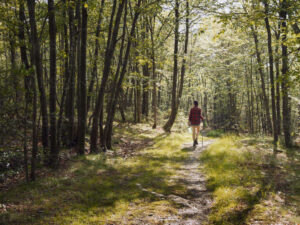Why You Need a Dose of Nature!
There is no better place than the great outdoors—in my opinion, at least. The benefits of getting out of the house and soaking up nature far outweigh the rewards of a Netflix binge. But sadly, a study conducted by the Outdoor Foundation in 2018 found that half of the U.S. population doesn’t go outside for any type of recreation at all. That statistic even includes simple stuff like walking and jogging.
The study also found that American kids play outside 50 percent less than their parents did. And they went on 15 percent fewer outings in 2018 than they did in 2012. The average kid spends 4 to 7 minutes a day playing outside and over 7 hours a day in front of a screen.

In the early 1980s, Harvard biologist E. O. Wilson came up with a theory he called biophilia: that humans are instinctively drawn toward their natural surroundings. But Wilson also believed our call to be in nature is in competition with our evolutionary desire to control our environment. That desire for control and comfort has become more important for many of us than spending time in the environment we were created to be in.
Things have gotten so bad that author Richard Louv coined the phrase nature-deficit disorder to describe the idea that humans, especially children, spend less time outdoors. The phrase is not an actual medical diagnosis, but Louv felt it should include “disorder” to emphasize the cost of alienation from nature. A quote from a fourth grader in Louv’s book, Last Child in the Woods, captures the attitude of today’s average child: “I like to play indoors better ‘cause that’s where all the electrical outlets are.”
We are wired to be in and connect with nature and living things. If we don’t spend time outdoors, regardless of the weather, we go a little haywire. E. O. Wilson believed that “nature holds the key to our aesthetic, intellectual, cognitive, and even spiritual satisfaction.”
In the 1980s, Japan’s forest agency created a nature-based wellness program. They called it shinrin-yoku—making contact with and taking in the atmosphere of the forest (forest bathing). The program promoted sitting or walking in the woods and “taking in nature.” The Japanese government created parks throughout the country and encouraged their citizens to forest bathe.
As the program grew, Japanese scientists began to study whether the government-funded program had an impact. One of those studies involved 280 subjects who spent 15 minutes sitting in and walking through nature. The results showed that the forest environment promoted lower cortisol levels, lower pulse rate, and lower blood pressure.
A study published in February 2023 provided evidence of forest bathing as a cost-effective strategy to promote and restore psychological well-being after the COVID-19 pandemic. The study saw a significant reduction in anxiety in the 86 adults who spent time hiking in the forest.
In another study, people with the highest levels of stress felt a significant drop in depression after only two hours in the woods.
In 2016, Rachel Hopman, a graduate student at the University of Utah, led a study that found that a 20-minute walk through a park can cause profound changes in the neurological structure of our brains. This leaves us feeling calmer and with sharper, more productive, and more creative minds. The study also revealed that people who used their cellphone on the walk saw none of the benefits.
Twenty minutes seems to be the magic number. A study at the University of Michigan confirmed that a 20-minute dose of nature, three times a week, efficiently dropped levels of stress hormones. The catch to the study—the participants couldn’t take their phones with them.
The two studies seem to imply a conflict between technology and nature. If you think about it logically, technology is the opposite of nature. Take it a step further, and you understand that it’s the opposite of what we were created to thrive in.
 When you spend time in nature, your brain enters a mode called “soft fascination.” The term refers to the fact that when you’re in nature, you lightly focus outwardly on the world around you. This is the opposite of what your brain does most of the time when it focuses inwardly. Brain scans show that soft fascination is a lot like meditation. So, people who don’t like sitting and focusing on their breath can get similar results from a walk in the woods.
When you spend time in nature, your brain enters a mode called “soft fascination.” The term refers to the fact that when you’re in nature, you lightly focus outwardly on the world around you. This is the opposite of what your brain does most of the time when it focuses inwardly. Brain scans show that soft fascination is a lot like meditation. So, people who don’t like sitting and focusing on their breath can get similar results from a walk in the woods.
Reaping the benefits of nature doesn’t have to be complicated. Just passing by some trees as you walk to lunch has benefits. Hopman says that “almost immediately when people are in nature or even see nature, they report feeling better and their behavior changes.”
Just having plants in your office will increase your productivity. One study found having plants in the office increased work productivity by 15 percent. The study also found that people liked their jobs more when they had plants in their office.
Even having a view of nature from a hospital window helps people recover more quickly. A study published in Science in 1984 found that hospital patients with window views had fewer complications, complained less, and didn’t need to take as many pain pills.
No matter where you live, you can find a place to spend time in nature. Even 10 minutes can make a difference. But if you really want to lower your stress level and maybe even your blood pressure, take time to get outside for 20 minutes, 3 times a week. Oh, and leave your phone behind.
Stay Strong,
Bo Railey

